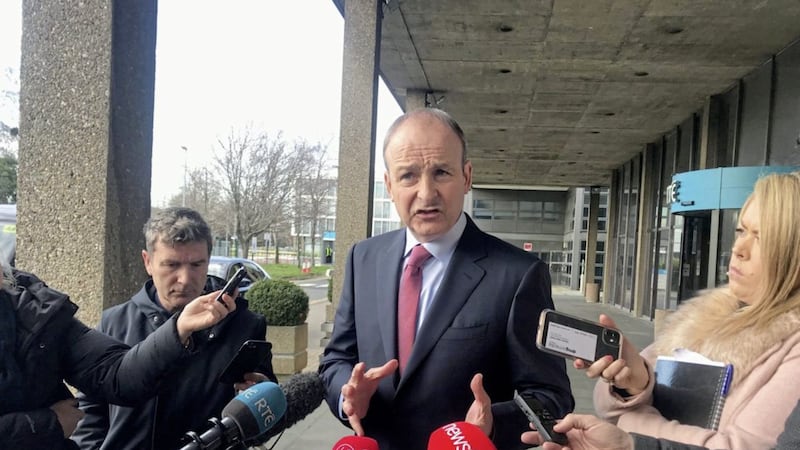In Northern Ireland there is a legal requirement for Sinn Féin to be included in the executive; which is why Fine Gael and Fianna Fáil didn't appear to have any difficulty in bringing whatever influence they had into supporting the efforts of Julian Smith and Simon Coveney to reboot the assembly a few weeks ago.
Yet, while they were exerting that influence up here, they were also insisting they wouldn't be entertaining even the mere prospect of Sinn Féin in a voluntary coalition with them in the Republic.
So, adding to the political/constitutional partition of Ireland, maybe we should add a moral partition, because, in the eyes of Martin and Varadkar, Sinn Féin - with its past history and links - was not fit for co-governance with them.
But what about today? Sinn Féin got more votes than Fianna Fáil and Fine Gael, lost out by one seat (the Speaker's) to become the largest party in the Dáil (although its surplus delivered quite a few unexpected extra seats for left-wing candidates) and Mary Lou McDonald is first out of the traps in trying to construct a government.
Does electoral success make the party any more fit for government in the Republic than it was this time last week? If Sinn Féin agreed a deal with Fianna Fáil that allowed Martin to become taoiseach, would that make the party fit for government? If there's another election and Sinn Féin does even better (its under-fielding of candidates probably cost it between 6 and 10 extra seats), would that make it fit for government?
I noted in last week's column: ''Unless Sinn Fein crashes and burns at this election, or maybe the next one, it looks like it is here to stay as a mainstream, reasonably popular party, the only one with a significant presence on both sides of the border. That presents a problem for those parties in both jurisdictions who regard themselves as 100 per cent democratic, because they're going to have to establish some sort of relationship with Sinn Féin''. That moment seems to have arrived. Sinn Féin can no longer be ignored by the self-styled political establishment.
So, will Fianna Fáil buckle and come to an arrangement with McDonald? The answer to that probably depends on how it thinks it would do in another election in a few months time. Even when opinion polls were suggesting that Sinn Féin would do well, there was still an expectation that the polls had overestimated its level of really-will-come-out-on-the-day support and that voters, fearful of a potential surge of republican socialism, would rally behind Micheál Martin - allowing him to create some sort of broad coalition (maybe propped up by a confidence and supply deal with Fine Gael) which left Sinn Féin adrift.
But Fianna Fáil took a massive hit, down on both votes and seats since the 2016 election. Martin's leadership isn't safe, not least because he may be the first leader of the party who will never be taoiseach and there's no guarantee that a second election would improve the party's standing. In other words, Martin's fate now seems to be in the hands of McDonald which, in turn, means her demands for and within a coalition will be high. How high is unclear at this point.
It is important to remember, though, that while Sinn Féin's success certainly deserves to be described as a significant breakthrough, it's far too early to describe it as a revolution. It only moves into that territory if and when it is capable of delivering the change it set out in its manifesto. And even though 25 per cent is a huge improvement on 14 per cent (the party's result in 2016) it is still only a quarter of the electorate and just under a quarter of the TDs and Sinn Féin can do nothing without reaching huge compromises with potential partners; compromises which could lose it votes at a subsequent election.
Something has certainly changed in southern politics, but whether the change is deep-rooted and permanent is harder to gauge. Revolutions are not built on compromise and coalition, but on a radical party with its own mandate, majority, government and agenda. Sinn Féin is not in that position. Ironically, not being tested and judged entirely on its own merits and policies may prove more useful in its quest to become part of the political establishment it still pretends to despise.








